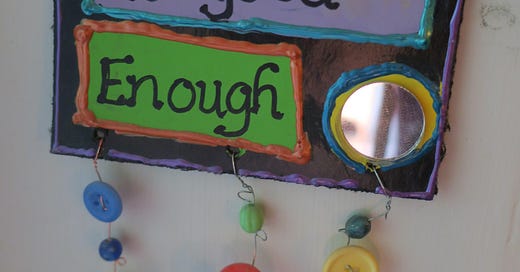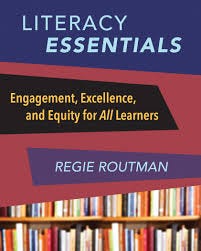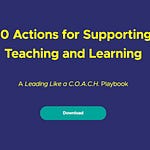In this inaugural podcast, Regie Routman, author of Literacy Essentials: Engagement, Excellence, and Equity for All Learners, shares her thoughts on what we need to focus on right now during these difficult times. We talk about poetry, about addressing the unique needs of everyone, and how we can embrace “Good is good enough.”
Important Links (available on original site only):
Regie’s poetry videos: Nurturing Writers in Uncertain Times
Regie’s writing project: A Notebook for You
Transcript
Matt: Thanks Regie for joining me today and this conversation about what's essential right now in education.
Regie: Thank you for inviting me, I’m delighted to be here.
Matt: This is Regie Routman, author of many texts on literacy and leadership most notably, most recently Literacy Essentials: Engagement, Excellence, and Equity for All Learners. This was a book that we did on the blog as a book study two years ago, and this is the inaugural podcast episode and I couldn't think of a better person to have here then Regie.
Regie: Very kind, thank you.
Matt: Just a little bit of background: I came into the elementary principal position in 2011. That school was a high poverty school that had already embraced Regie's work. The teachers had said, “You really need to come to the Literacy and Leadership Institute in Madison”. I resisted at first, saying that I have the schedule to get ready and I've got to get the budget square away first and I didn't buy in right away. Once I saw it in action and the teachers were the leaders in the professional development, I just said, “Wow”, this is real, kids are going to be engaged by this, it just makes sense. I went the next year and that's when I met you. So we've been colleagues, friends...I consider you a mentor and I'm very grateful to be able to talk to you today.
Regie: Thank you Matt. I think we are equals, we’re educators, we're learning from each other. It has been a joy to watch you change, to watch your beliefs shift over the years in what you find essential now (and this is true for all of us) is not necessarily what we saw as essential years ago.
Matt: That's very true. Now, what’s essential now is the big question related to your book Literacy Essentials and we want to take time for that: what you would tell someone in education what we need to focus on right now with everything going on with the pandemic. You have a cool project out now with Gail Boushey on poetry and nurturing writers in uncertain times. When I first saw this come out, Nurturing Writers in Uncertain Times, I thought, “Regie is going to choose poetry,” and you did! Why did you choose poetry?
Regie: (laughter) It’s such a good question and really an easy question for me. These times are so different and full of so much fear and trauma for so many people. I was plagued, it kept me up at night, “What can I do to make things easier for families and students and teachers?” The equity issue pulled at my heart as it always does. I’m in Seattle and the public schools are giving out food and books for the neediest schools. I was concerned about kids that didn’t have computers, access to the same literacy advantages as other kids, so I came up with the idea of donating notebooks to these same sites. You can find that at regieroutman.org along with my writing project with Gail Boushey. The idea was to get students pencil and paper, it’s still good technology and to get kids writing about things that matter to them during this time. In all the years that I’ve been teaching, I have found poetry to be the great equalizer. For kids that are struggling, that are having great difficulty with following the rules, they take to poetry like a duck to water. I am talking about starting in kindergarten. The other thing I love about it is, one of the biggest shifts and hardest shifts for people to make in education and the kind of work kids are being asked to do, this is not a time to worry about following the rules, to worry about, “Is their spelling correct? Are they using capital letters?” This is a time to celebrate, and I say that word meaningfully, to celebrate what kids can do and have them soar. Poetry does that. They don't have to write a lot, they don’t have to follow the rules, and it’s very enjoyable. What we’ve done in this video series is to take you through how you might do that at home, as a parent, a teacher, a family member, and everyone is successful, it’s comforting. It’s joyful. It’s freeing.
Matt: I found myself engaged while watching, especially when you were writing the poem, “Dandelions”. You said “lowly weed in the world,” and I wrote that down. I wanted to tell you that it was such a cool line that you said, and then you incorporated those ideas with weed and flowers. You mention nurturing and not following the rules, and I think that can cause anxiety for any writer when trying to following the rules when you just want to get words down on paper. Poetry seems to allow for that, gives them an entry point into writing.
Regie: And also because poems tend to be shorter, instead of, say, an essay. It can be just a few words. In the video series, I demonstrate my writing process. You can see me do it on the screen, the thinking and the revising, and what’s going on. Writing is hard, and the satisfaction you feel from writing is great. Kids get that. I also love it because you start with the whole. I see that shift that all teachers and leaders have to make for teaching and learning to become joyful and meaningful for all students. You start with a whole poem, a whole idea, I tell the story first, and everyone is successful, even kindergarten kids who may only know a couple of letters and sounds. So I love that. It’s so critical right now.
Matt: You base that on something your noticing - dandelions - which gives every kid, that everyone can notice something. You picked out something as simple as dandelions, but you make it into this rich text.
Regie: I was very careful. I wanted it to be a neutral topic. “What are you noticing today, or now, that you didn’t notice before?” and to model something positive. I’m noticing the natural world a lot more. We are inside, looking outside, and I am really looking at something as I take a short walk. This is what I call choice within structure. I’m modeling a poem about dandelions (which I’ve never noticed until now), and the message to kids and parents is, “What are you noticing?” They can take that same process and they choose the topic. What’s very important right now is something Larry Ferlazzo says on a wonderful video he’s done through Education Week, to just throw out the regular curriculum and to ask your kids what they are interested in. What do they want to learn and start there. Don’t worry about the skills in isolation. I think some of the things we need to be concerned about now are kindness, being kind to ourselves, to our kids and families we are working with, and making whatever we are doing with them relevant. Easy - this is not the time for complex projects. I think putting people first. In Literacy Essentials, in the engagement section, that is where we need to start. I have four parts there: developing trusting relationships, accelerating learners, creating a thriving learning environment, and teaching with purpose and authenticity. This is where we can start, with this home-school connection and what parents are doing with their kids at home. You’ve got to set up a culture in your home, in our virtual classrooms now that allow for that kind of trust and celebration and purpose. A lot of that is offering choices and being a really good listener. What is it that they need? Keeping close relationships with the kids and their families. It’s hard.
Matt: You mentioned the home-school connection. I am meeting with staff in weekly meetings; we’re making them optional. They are noticing that kids are not as engaged as much right now and I think people are feeling some sense of, getting worn out and not noticing what's going well. So I think that's just really an important point of involving the families and how to create that structure together and noticing what's going well.
Regie: That’s really hard to do. I was noticing in a New York Times article recently on the front page that parents are having a very hard time teaching their kids at home. They didn’t know that teaching was so hard.
Matt: For any family that has thought about homeschooling, they are getting a real experience right now. Although I feel for the families trying to juggle jobs and homes, or parents who are unemployed. They are dealing with unique stressors right now.
Regie: This is a hard time for parents. I don't know if your teachers are doing this, or for that matter even for you to do, it would be great to just start each day or each lesson with a read-aloud. Even if you're teaching high school, to pick a book that allows you to talk about it and to jump off and write something about it to just start off with something relaxing. Kind of a beginning to the learning day. One of the books that I like is Be Kind. It is a picture book by Pat Zietlow Miller about kindness. It would take less than 5 minutes to read it and then I might ask the kids to reflect on what's a kind act that someone did for you or that you did for someone else. Let’s talk about that. Let’s write about that. If there's a way for you to do some demonstration writing in front of the kids, do that because that's really helpful too, the kind of modeling that you're expecting.
Matt: What you did in the videos is such a cool example, I shared that with my staff yesterday, where you pulled up your whiteboard and you had a picture in picture. You were talking as you were writing, at the same time, and they can see the process of writing. You could see poetry kind of in action, the development of it. I think that's a simple shift that I think teachers could do in keeping things manageable enough for kids and for themselves.
Regie: I think what's really important there is that there wasn't a lot of planning for me. I talked about the fact that writing is a recursive process that it's not linear. So when I was done with that, I was really done because I was revising it as I went along. I was re-reading it, I was rethinking, I was talking out loud, and I think it's important for kids to see our thinking. That thinking aloud and seeing our struggle that we go through, that it's not perfect, and that that's okay.
Matt; Yeah, listening to kids, like you were saying, and having a conversation about what they're noticing and with kindness and even doing some shared demonstration. My wife, she teaches special education, and she was dictating a letter to a friend they haven’t seen in awhile since we've gone to remote learning. Doing it in front of him and putting up the whiteboard, there’s a lot of options that I think your video, as well as the conferring conversation with Gail, it was just a cool example that anyone can do tomorrow, today.
Regie: I think so and that's really why I love poetry and I think it’s really a great way to start a lesson. In fact, I thought it was quite interesting that, in the New York Times which I read every day because I am from New York, the national desk now, when all the reporters get together and talk about what they are going to write about, they start by reading aloud a poem every day. And so I thought that’s just wonderful to read that poem, to get people in the mood, and relaxation, and the beauty of words, settling down, to soothe your soul before you have to do this hard work. I think that's such a great way to start a lesson. So the read aloud could be a poem and it could be a poem that you’ve written together, perhaps as a class. That’s easier in some places than others. I also like poetry writing because if you just have paper and pencil at home, you can do that, you can put together a poetry anthology by stapling papers together. It could be a writing record, it doesn’t have to be poems, a writing record of what you did during these uncertain and difficult times. I think the hardest thing is to keep the celebration and joy part of whatever it is you’re doing - as a principal, as leaders, as teachers, as kids, and how do you do that and bridge that digital divide. That is why I like poetry. The other thing I would say is I think this is hard to do but I would include in my lessons every once in a while, “Let's talk about gratitude, we’re all struggling, we’re tired of being indoors, but what are we grateful for?” Maybe writing a letter to somebody telling them how much you care about them. Or even, if you can do this, especially where not all the kids have computers or a hotspot, actually writing a letter to each of your students. At the elementary level, I think that's doable and enclosing a stamp and having them right back to you. I think that whole connection, we need to keep our kids and family socially and emotionally whole, which is so difficult to do and to put that before any mandated curriculum.
Matt: I couldn’t agree more. That leads to what’s essential right now for educators. You’ve mentioned celebration and stopping and being grateful. I’ve tried to do that with team meetings, starting with what’s going well, or checking in. One teacher yesterday shared that a fox family had taken up residence on their property. She was sharing pictures and it brings in those positive experiences and what’s going well right now. You mentioned parent involvement. What else is essential right now for us in education?
Regie: I think that those are the most essential things, that we do right now. Our social and emotional well-being, the strong connections with families and listening to where people are kind of at. Making sure that the curriculum allows some choice, asking kids what do you want to learn about right now and being adaptable. Not worrying so much about tests. I just read recently, which I thought was great, a professor at Stanford University who was, up until the last minute, was going to give a final to his students, decided it was just too much. Everybody was in an emotional state including him. So instead of a final, he had each of his students submit a photo of something from the natural world and that was the final. They were gorgeous, of sunsets and a bird or maybe just the way the light hit a tree, and they posted all of those photos for all students in the class to see and that was, I thought, just terrific. Anything we can do to help people feel successful. Sometimes it feels like the world is ending. We are going to come out of this eventually, but we want to help families and kids come out of this as whole as possible. And then finally Matt, and this might be a good place to end: Years ago when I was teaching and I would go into a school and the teachers were always, you know how we are, we have high expectations, that's great, but I never heard a teacher say “You don't have to do anymore. It’s fine as it is.” But it’s always, “Improve, improve, improve”. When I left one of the residencies, I had a teacher give me (I have it on my wall) this huge necklace that was handmade with paper. It says on it, “Good is good enough.” That was the message they took away which I was thrilled about. We are all trying to do the best we can. We need to slow down, breathe, find moments of joy, do the best we can, and accept that our families and student are doing the best they can. Good is good enough. So, I wish everybody peaceful days during these very hard times. Thank you Matt for this opportunity to talk with you. I appreciate our friendship and collegiality so much.
Matt: “Good is good enough.” I am going to write that on the cover of my journal.
Regie: I am going to send you a photo of that.















Share this post